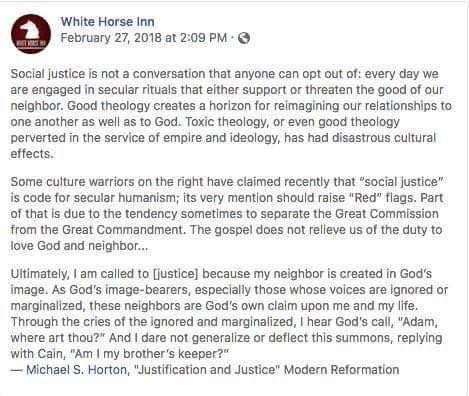
Social Religion is spreading throughout American religion like Necrotizing Fasciitis, a dangerous infection that causes tissue death in living bodies. In this case, Social Religion is eating away the Body of Christ. Even the best theologians, like Michael Horton, are completely abandoning the Gospel-commitment they’ve fought their entire careers for, in exchange for sitting at the cool kids’ table of
Michael Horton is a professor at Westminster California, editor of Modern Reformation Magazine and co-host of The White Horse Inn. Heretofore, I have never critiqued Horton (as best my memory serves), and until recently The White Horse Inn was on the list of P&P’s recommended resources. The title that Horton holds at Westminster is the “J. Gresham Machen Professor of Theology and Apologetics.”
To be abundantly clear, Horton’s doctrinal drift is as recent as it is noticeable. In fact, it’s as new as the Social Justice bandwagon that has only recently rolled into town. One of the most frustrating things for me about the current Social Religion movement (which is currently called “Social Justice,” but is no different) is that while it is swallowing up evangelical Christianity like the Nothing in the Never Ending Story, the men promoting this Gospel-departure seem blissfully unaware that their positions are new to them.
As my doctrine was reforming more than a decade ago, I tuned in weekly to The White Horse Inn and it was there that I discovered the difference between Law and Gospel (coupled with Chris Rosebrough’s Fighting for the Faith, these podcasts were pivotal in teaching me the difference). I was intrigued that the panel, consisting of Rod Rosenbladt (a Missouri-Synod Lutheran) and its two Reformed co-hosts (Kim Riddlebarger and Michael Horton) were in unanimous agreement upon the Gospel and its definition. Providing clear distinctions between the Law and Gospel has been a central theme of the White Horse Inn for years, to their commendation.
Many times on my podcast I have told people something along the lines of, “If you are new to Christianity, or want to learn a basic grasp of the Gospel, or want to know the difference between Law and Gospel, listen to the White Horse Inn.”
However, the trajectory of Horton and the White Horse Inn has been too great to bear in silence. Horton is among those evangelical leaders – like those prone to New Calvinism (even though Horton’s Calvinism is the more traditional kind) – who have undergone seismic paradigm shifts on the nature of Law and Gospel. I provide the following as an example, and I’ll provide a point-by-point below.

“Social justice is not a conversation that anyone can opt out of…”
Of course, no one is trying to “opt out” of a conversation on Social Justice. The Dallas Statement was an attempt to converse about the subject, promoted by significant and influential signatories. Horton and the other Social Religionists have altogether ignored the statement. Actual responses to the Dallas Statement by notable theologians I can count on one invisible finger. It seems that the Warriors of Wokeness don’t want a conversation, they want to signal their virtue in the echo-chamber of academia.
“Social justice is not a conversation that anyone can opt out of: every day we are engaged in secular rituals that either support or threaten the good of our neighbor.”
Horton here makes the same mistake that’s common to most of the Social Religionists in American evangelicalism. He assumes the term Social Justice is an innocuous term, or perhaps a term that lacks definition until it is given it by us.
In fact, the term Social Justice is a historically well-defined and established term that relates to a proletariat-bourgeois power struggle and the redistribution of wealth. I didn’t make up the term. Horton didn’t make up the term. Tim Keller did not make up the term. The term Social Justice was invented by the Jesuit priest and early Communist philosopher, Luigi Taparelli. In America, the term and accompanying concept
Horton commits the sin of Scriptural disobedience, ignoring Paul’s warning to “See to it that no one take you captive with vain philosophies and empty deceit according to human tradition and the elementary forces of the world” (Colossians 2:8). Social Justice is not a Biblical extrapolation (or else the trusted theologians in our seminaries and churches would have discovered it long before 2016) but it is – and always has been – a worldly philosophy whose origins we can easily trace back to Jesuits and Marxists (the history is indisputable; read the hyperlinks provided above).
Social Justice is nothing but Marxist philosophy in a clerical collar.
Horton here conflates “Social Justice” with “helping our neighbor.” A South American commie Jesuit could not have said it better. The argument is
Some culture warriors on the right…
Full stop.
Horton is trying to demonstrate that the bulk of those opposing Marxism’s born-again experience
Some culture warriors on the right have recently claimed that “social justice” is code for secular humanism; it’s very mention should raise “Red Flags.”
No, we’ve claimed that “social justice” is code for Marxism and Liberation Theology (because it is). And it does raise Red Flags, with emphasis on the color Red.
Horton goes on to argue that Christians are called to “justice” – especially for the voices that are ‘ignored and marginalized.’ This is true. But there is a world of difference between what Christians call ‘justice’ and what those who invented the term, ‘Social Justice,’ mean by it. For example, when right-thinking Christians think of justice, we should think of abortion and the Biblical mandate to convict under
In other words, if we truly loved our neighbor, we would not be promoting “Social Justice” if we mean that term the way that the people who invented the term mean it (or the way Tim Keller, Russell Moore, and other communitarians mean it).
What Horton has done, and what so many of our leaders ranging from Tim Keller to Beth Moore to Russell Moore have done, is promote a subversive political philosophy by cloaking it in religious language.
It particularly stings for me that Horton is associated with the name, Machen, because the great 20th Century theologian would have publicly denounced Horton for his recent doctrinal deviations and immediately separated from him (I’ll explain why in a moment). For me, Horton serving in a chair named in honor of J. Gresham Machen is like Joel Osteen serving in a chair named in honor of John Calvin.
Machen, who separated from Social Religionists like Horton, said the following:
The preacher comes forward, not out of a secret place of meditation and power, not with the authority of God’s Word permeating his message, not with human wisdom pushed far into the background by the glory of the Cross, but with human opinions about the social problems of the hour or easy solutions of the vast problem of sin. Such is the sermon…Is there no refuge from strife? Is there no place where two or three can gather in Jesus’ name, to forget for the moment all those things that divide nation from nation and from race to race, to forget human pride, to forget the passions of war, to forget the puzzling problems of industrial strife, and to unite in
over flowing gratitude at the foot of the Cross? If there be such a place, then that is the house of God and that is the gate of Heaven.”
Other quotations from Machen, which should surely pain the side of Horton, include:
The older evangelism, says the modern liberal preacher, sought to rescue individuals, while the newer evangelism seeks to transform the whole organism of society: the old evangelism was individual, the new evangelism is social.
The greatest menace to the Christian Church today comes not from the enemies outside, but from the enemies within; it comes from the presence within the Church of a type of faith and practie that is anti-Christian to the core.
But one thing is perfectly plain – whether or not liberals are Christians, it is at any rate perfectly clear that liberalism is not Christianity. And that being the case, it is highly undesirable that liberalism and Christianity should continue to be propagated within the boundaries of the same organization. A separation between the two parties in the church is the crying need of the hour.
The plain fact is that liberalism, whether it be true or false, is no mere ‘heresy’ – no mere divergence at isolated points from Christian teaching. On the contrary, it proceeds from a totally different root, and it constitutes, in essentials, a unitary system of its own…Christianity is being attacked from within by a movement which is anti-Christian to the core.
For more on Machen, to demonstrate how far Horton has departed from the faith of his fathers, click here.
[Contributed by JD Hall]











